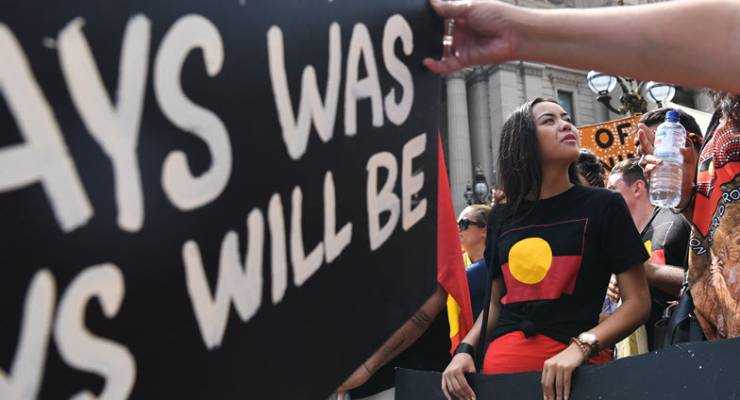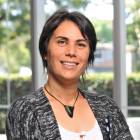
Ten years ago, I gathered with many people from the local Indigenous community to view a live broadcast of the Apology at the Aborigines Advancement League. There was a lot of sorrow in the room but it was tempered by hope — the feeling that finally, after so long, a government had decided to do the right thing and work towards rectifying wrongs.
Kevin Rudd’s impassioned and beautifully constructed speech was warmly received from the crowd, with cheers, but also tears. In contrast, then-opposition leader Brendan Nelson’s speech got loudly jeered due to his indignant refrain that there would be “no compensation”. Jeered, that was, until someone muted him and the crowd went back to processing the historic moment that had just happened after nearly a decade of refusal under John Howard’s rule.
On the day, I had two people on my mind: my grandmother Emily who had been featured in a 1990s exhibition on the Stolen Generations entitled Between Two Worlds; and activist, poet and photographer Lisa Bellear whom I befriended at university. Both these women had passed away prior to the Apology. With Nelson silenced, the crowd shared thoughts via an open microphone. I was overcome as I relayed to the crowd how sad I felt that these women had not lived to see this day because I believed it would have meant so much to them.
Looking back, I feel foolish for thinking we were on the precipice of change; that we were seeing progressive leadership, and that mistakes of yesterday were no longer doomed to be repeated. Ten years later, what does the Apology actually mean?
In the lead-up to this year’s Invasion Day rallies, Lingiari electorate hopeful Jacinta Price erroneously linked Rudd’s “sorry” with the Change the Date campaign, stating that we’d had an apology and should therefore move on from protesting invasion. The Apology was not a catch-all for the processes of invasion, colonisation and genocide Indigenous people have survived since English settlement. It was specifically an Apology to the Stolen Generations, as recommended by the Bringing Them Home report, for the many governmental policies and practices, which saw thousands of children removed from their families over several decades.
Yet the reality is Price illustrated a belief I have encountered many times — from everyday Australians through to aspiring right-wing politicians. Ignorance of history has morphed this event into a general apology to Aboriginal people so society can remark that we’re “never happy” and are milking victimhood for fun. Regardless of how often Indigenous people are painted as unforgiving though, evidence states little has changed and indeed, many things are getting worse.
Since at least 2009, reports have continuously indicated that more Indigenous children are being taken now than were taken during the height of the Stolen Generations. Last year, it was reported that Aboriginal children are being removed by some governmental departments at a rate 10 times that of non-Indigenous kids.
In 2016, law academic Larissa Behrendt highlighted that not only were more Aboriginal kids being removed by authorities, but less were being placed with suitable extended family members. The fear that we are creating another Stolen Generation has been echoed, yet these fears continue to fall on deaf ears.
Prior to the Apology, most Australians seemed to believe the conservative narrative of neglected Aboriginal children being taken to loving families who could look after them. These narratives purposely erased stories of institutions such as the Cootamundra Girls’ Home, or my grandmother’s own experience of being taken to Jay Creek in order to learn domestic skills so she could be given as an unpaid servant. They erased copious narratives of the other institutionalised stolen Aboriginal children, many of whom were physically and sexually abused; their stories since becoming part of the Royal Commission into Institutional Sexual Abuse.
Yet post-Apology, if we were looking to discontinue removing Aboriginal children then putting them in institutions, prison statistics state we’re failing. Last year more than 100 organisations wrote to Turnbull demanding action after reports stated Aboriginal children were 25 times more likely to be in detention and 17 times more likely to be under some form of youth justice.
The Four Corners report on Don Dale created needed exposure, not only regarding the petty criminalisation and incarceration of Aboriginal children, but also the abuse they were suffering at the hands of the state. It showed Australia would rather criminalise and torture a homeless Aboriginal child than find him support and stability.
Don Dale is just the tip of the iceberg, and yet Turnbull only called a royal commission on the NT because that ABC had embarrassed his government into limited action. All over the country, Indigenous kids are being sent to similar institutions. In Victoria, they’re imprisoned at 11 times the rate of non-Indigenous kids, whereas in WA it climbs to 56 times. It may seem strange to compare youth incarceration with Stolen Generations institutionalisation. When you consider though that 57% of these kids are on remand for crimes of poverty which they may not be convicted for, we see similar justifications being used to remove Aboriginal children from communities as they were during the Stolen Generations. The bigger crime remains to be born black.
As this anniversary rolls around, we will see politicians noting it as a significant point in political history. They will talk again about closing gaps, and recognition. Yet what will actually change? Will we return on the 20th anniversary only to find that our kids are still being removed and institutionalised at exorbitant rates with the politicians unable to commit to doing more than symbolic gestures? Will we accumulate more reports and royal commissions with pages full of recommendations left to gather dust by successive governments?
Ten years ago, the prime minister apologised for the acts of previous administrations, which led to the Stolen Generations, and Indigenous people met him with the hope that together we were on a path to change. Ten years later, those hopes are all but dashed.








Australia must be the only country with a thriving Aboriginal industry. It is a growth industry and should be counted in the GDP stats.
Kindly do some research and meet a few Aboriginals.
That’s a remark that says a lot about the writer and nothing about the descendants of this country’s original owners.
There is not a single part of your post that does not make you look really stupid.
WOW. You sound like the liberal front bench!
What do you mean? Nothing, I think.
Celeste I work pretty close to the pointy end as a teacher in a school with slightly more than half Aboriginal students. I am from the actual town and knew plenty of people who were good folks, but had many obstacles. It is worth noting that local balckfella, whitefella stuff is good, but not so much with those from away. I would love to see every indigenous kid at home, but that is impossible here. We have some highly dysfunctional families, many of whom have moved here because they are near relative in the jail down the road. Due to drugs and other issues some families are just not safe for kids, and there are not kinship ( believe me I know) fostering opportunities available. We have put many support services in place centred on our school community. Alas the crime rate is quite high and we will do nothing about incarceration rates in the long run, unless we can lower the crime rate. A lot of this would not be hard if we were one mob, but the ones from away have no elder contacts in this country. While the kids are locked up, they are often locked up for doing something wrong. It is the early stage of redirection that we need, so they don’t get arrested in the first place. I would also love to see more Aboriginal role models who are not footballers, but artists and musicians. I know a lot of great little kids who often just need a leg up, but their home life scares me. I do not have a fix, I just know that many of the problems such as incarceration or removal are based on events which really are a danger to children or society. I also know a lot of people both white and black who are busting their gut to find solutions at least at school level. While almost all the Stolen Generation removals were unjustifiable evil, I don’t think that happens where I live very often, services are very slow to remove children here. I also know that I despise the present government for their curent actions in these areas.
Thanks for this interesting contribution from someone with real experience. It’s obviously not an easy problem to solve.
Excluding Rudd’s sincere & heartfelt apology, have these apology events since morphed into political opportunities for Prime Ministers?
Turnbull is planning one for the victims of institutional sexual abuse despite being a member of a Coalition which resisted a Royal Commission despite victims bravely coming forward during the Howard/Abbott years. Gillard had the humanity to announce the Royal Commission – ironic really, as she was criticised for being ‘barren’ & likely indifferent to the best interests of children.
Unfortunately, Celeste, Aboriginal communities will suffer until a truly benevolent PM is elected, one who prioritises social policies. The current one hasn’t a clue.
“Words are easy, words are cheap
Much cheaper than our priceless land
But promises can disappear
Just like writing in the sand”
It never ends. In the 90s, the Bringing Them Home report; in the 2000s, the Sacred Children report and the ‘apology’. More reports and a royal commission since then.
Just recently an aboriginal appeal to have an official group advising parliament, rejected out of hand by Turnbull. The hardship statistics have hardly shifted in many decades and I frankly have no idea where our indigenous neighbours will turn now. Historically, unfortunately, most indigenous groups in other parts of the world have had to resort to violence to finally get their voices heard. I hope we can somehow avoid that, but our political leaders (both parties) are so apathetic and pathetic, who knows.